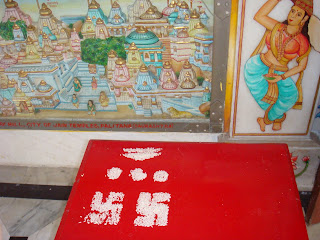Mumbai Tour
Saturday, February 27
We are working on limited sleep, the adrenaline of being half way across the world from home, and the food-induced coma of our first authentic Indian lunch provided by our amazing hosts at congregation Keneseth Eliyahoo. We pile into our charter bus, our second home in Mumbai, and we take off for the first of many sightseeing tours through the crowded streets!
Our first stop is a beautiful, small Jain temple. Before entering, we are told that the Jains are among the oldest religious minorities in India (where 85% of the population is Hindu) and are currently often compared to the stereotype of American Jews because they tend to be among the wealthiest and most philanthropic in India. We are greeted by swathed fabrics of every color and detailed sculptures of elephants, guards and other figures all fancily outfitted and bejeweled. Moving in further we enter a small sanctuary that contains gilded doors and columns, a domed ceiling depicting the planets and other astrological scenes, and congregants scattered about with random accoutrement including dry rice and step stools acting as miniature tables. Most obvious to all of us are the (inverted) swastikas…everywhere. This is the first time that most of us learn about the symbol’s long history for the Jains, and most of Asia’s religions. In this temple, the swastika is a sign of peace and well-being, and we watch a few women kneeling on the floor slowly crafting swastikas out of the rice on their step stools. Though the symbol has always meant something very different to us as Jews, I slowly start to feel what these congregants are feeling, serenity. The temple is nothing if not a peaceful retreat on a typical chaotic Mumbai road, and that is a real coup in a city like this.
The next stop is the Hanging Gardens, another surprisingly tranquil spot. I am surprised to see such a large patch of green in a city that I’ve decided is anything but (justified or not). Topiaries are playfully shaped into life-size horses and elephants while archways invite people onto every inch of lawn for respite, a common theme I’m beginning to see in India. The gardens ‘hang’ over a main reservoir and serve as one of the highest points in the city, making it an ideal spot for catching the sunset and views of the distant western shore.
We cross the street to enter Kamala Nehru Park which offers equally amazing views of notable high rises along a different shoreline. We are impressed but immediately make a beeline for some shade to watch children playing on the tri-level “Old Woman’s Shoe” from the fairy tale.
Mani Bhavan is our next stop. This mansion was the residence for the great Mahatma Gandhi in Mumbai between 1917 and 1934 and now serves as a memorial, museum and library. We are treated to four stories of books, statues, photos and a 30-piece miniature figurine depiction of Gandhi’s life story. Starting from the fateful day he was traveling as a lawyer in South Africa and booted from the first class car to which he held a ticket, to his famous non-violent movement that inspired MLK Jr. and America’s own Civil Rights Movement, to his death in 1948. Out on the sidewalk, I am already thinking of a display inside with a letter from Albert Einstein to Gandhi praising him for his great work and I’m wishing I’d been born a century earlier to have witnessed it all firsthand.
Last stop of the day and all we can swing is a drive by for a photo op, but nobody wants to miss the legendary Dhobi Ghat, the largest outdoor laundry service, where clothes come from all over Mumbai in the morning, get sorted, flogged clean by stone in individual pens, dried, resorted and returned to the correct address by nightfall. In a city of over 20 million people, this system continues to work flawlessly and has been studied by Harvard students for its ability to run so efficiently. There are only 12 of us to keep track of and after a day of sightseeing, I feel as beat as that laundry!
Last stop of the day and all we can swing is a drive by for a photo op, but nobody wants to miss the legendary Dhobi Ghat, the largest outdoor laundry service, where clothes come from all over Mumbai in the morning, get sorted, flogged clean by stone in individual pens, dried, resorted and returned to the correct address by nightfall. In a city of over 20 million people, this system continues to work flawlessly and has been studied by Harvard students for its ability to run so efficiently. There are only 12 of us to keep track of and after a day of sightseeing, I feel as beat as that laundry!
Jessica Gronich





No comments:
Post a Comment